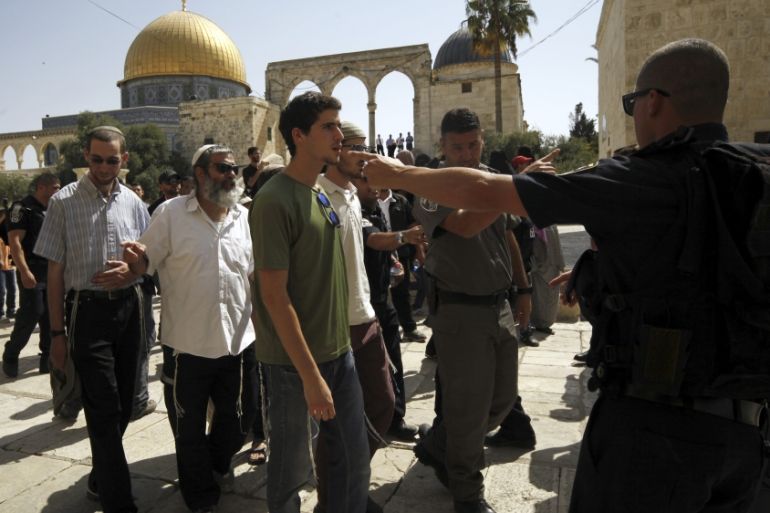Al-Aqsa status quo at the heart of new violence
The agreed arrangements about access to the holy site need to be established.

|
|
Diplomacy may be too strong a word for it, but the US Secretary of State John Kerry is due to meet Israeli Prime Minister Benjamin Netanyahu in Germany this week.
It is understood that Kerry then intends to meet Palestinian Authority leader Mahmoud Abbas and, importantly, King Abdullah II of Jordan – possibly in Amman.
Keep reading
list of 4 itemsTunisian lawyer arrested during live news report
Vladimir Putin sworn in for fifth term as Russian president
What’s at stake in Chad’s presidential election?
Several sources- Palestinian, Israeli and European- say Kerry is focusing on one major issue that many argue is the root cause of the current conflict: the status quo of what Israel calls the Temple Mount – the Al-Aqsa Mosque compound. These are the mutually agreed arrangements that govern access to a site holy to both Jews and Muslims.
The sources also say Kerry has a concrete proposal for all parties: to put down in writing exactly what these arrangements are as agreed at a meeting between Netanyahu and Abdullah last year.
Jordanian role
To understand the crucial Jordanian involvement, it must be clarified that the Al-Aqsa Mosque compound area is administered by the Jordanian Waqf or Islamic Trust- and it is this body that monitors Jewish access in consultation with Israel.
Israeli groups entering the Al-Aqsa Mosque compound are accompanied by police and guides from the Waqf are nominally there to ensure that no Jews actually stop and pray on the site and also to signal what many argue is the putative authority of the Waqf over the site.
As put by Barak Ravid in the October 20 edition of the Israeli newspaper Haaretz: “The Jordanians and Palestinians argue that Israel has violated the understandings, while Israel denies the claim, arguing that the Jordanian Waqf has not met its obligations and that the Palestinians have staged provocations on the Mount”.
Access restrictions
There have been a series of restrictions placed by Israel on Muslim access to the Al-Aqsa Mosque compound in recent times. These range from the complete closure of the entire Old City for Muslims to the imposition of age-limits on those seeking to attend Friday prayers.
But there are more permanent restrictions apparently reached in consultation with the Waqf that may have gone unnoticed. Shaul Arieli, another contributor for the Haaretz, cites a privately commissioned report that says “the confrontations are occurring on the backdrop of gradual but significant changes that were made to the Muslim’s entrance arrangement to the Temple Mount”.
The report goes on to outline new Israeli instructions – “whereby when there is a Jewish presence on the Temple Mount, Muslims, men or women, under the age of 50 are not allowed to enter”.
Israeli groups take tours of the Al Aqsa Mosque compound throughout the week, which effectively means that Muslims under the age of 50 are not allowed access to the site each morning from Sunday through Thursday.
This is not a temporary Israeli injunction that receives great publicity each Thursday night before Friday prayers. It is a permanent interpretation of the arrangements governing access that clearly changes the status quo of the site as understood by Jordanians, Palestinians and many in the international community.
Direct connection
If there is any doubt about the direct connection of the Netanyahu government to this change, it must be pointed out that among those Israelis who take regular tours of the site are cabinet ministers; in particular Netanyahu’s Agriculture Minister Uri Ariel who in the past publically advocated the rebuilding of the Third Temple on the site of the Al Aqsa Mosque.
Netanyahu belatedly announced a ban on any Jewish member of the Knesset or parliament from visiting the site. And then in the wake of angry criticism from MPs, including those supporting his government, he widened the ban to include Muslim members of parliament as well. So while Netanyahu insists there is no change to the status quo “in the past 15 years”, he introduces what is an unprecedented ban on some Muslims from praying at their most holy site.
The Israeli police and army take out the security card when questioned about their repeated incursions into the Al-Aqsa Mosque compound. Police spokesman Mickey Rosenfeld told me that a large amount of offensive weapons, including pipe-bombs, have been stockpiled there by what he calls “Muslim terrorists” and incursions have taken place to curb and prevent these activities and so maintain law and security on and around the site.
If there is a shred of truth in these allegations, then some Palestinians too stand guilty of ignoring the status quo – the arrangements that govern access to the Al-Aqsa Mosque compound.
|
|
But the argument can be strongly made that even if there are plans to forcibly protect the Muslim right to access the Al-Aqsa Mosque then this should be seen as a consequence of Israeli plans to change the status quo rather than the cause.
Once and for all
It is self-evident that if the root cause of the current round of conflict is to be addressed, it has to be established once and for all exactly what Israel and Jordan’s agreed arrangements for access to the Al Aqsa Mosque compound are.
If the initiative by the US Secretary of State does succeed it may hold to account an Israeli prime minister who stands accused not just of expanding and intensifying the occupation – but also of unilaterally changing an agreement about the site that more than any other defines whether or not there can be a semblance of peaceful co-existence.